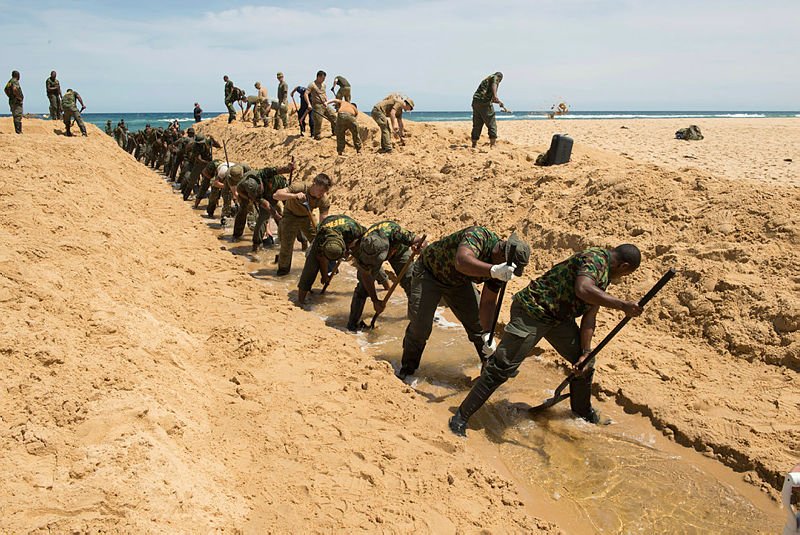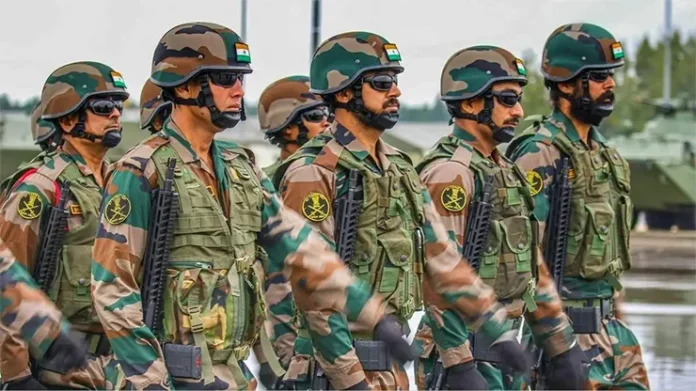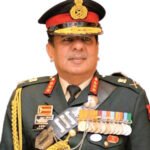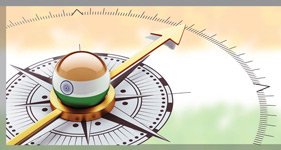The 21st Century poses multiple, complex, and dynamic global security challenges that nation-states face today. The world is seeing a transition to a multi-alignment world order shaped by intensified competition for resources and markets to secure strategic connectivity with overlapping and often conflicting interests. The emerging multitude of global threats aggravated by economic challenges, increasingly demands collaborative mechanisms, new partnerships, and greater international cooperation to be central to “Diplomacy 2.0”, which is more inclusive, proactive, multidirectional, and interconnected than ever before. The path to this journey must lead to the convergence of mutual national interest which requires the harmony of all organs of national power.
Defence, Diplomacy and Development are the three foundational constructs for the growth of a country. They are all interconnected conveying the strategic capability, credibility and global standing of a country. Without a strong defence capability, diplomacy stands weakened and development suffers. On the other hand, if diplomacy fails, deterrence and defence become vulnerable and development suffers.
Conversely, when a country lacks development growth, diplomacy lacks credibility and defence does not get resources for its empowerment. In the words of our former President A.P.J. Abdul Kalam, “Strength respects strength and not weakness. Strength means military might and economic prosperity.” Thus, defence diplomacy in the 21st Century, with its hard and soft power, has emerged as an important tool for shaping up foreign policy and fostering national interest.
Defence Diplomacy and its Functions
Defence diplomacy is a broader concept that incorporates the objectives and tasks of the latter, extending them to issues related to building trust, preventing crises and conflict resolution, defence dialogue, developing bilateral and multilateral cooperation, and also the use of armed forces in international missions, disaster relief and other humanitarian operations.
The Indian Ministry of Defence (MoD) defines defence diplomacy as the exchange of high-level defence-related visits, dialogue on security challenges and port calls, and defence cooperation as activities covered by training exchanges, combined exercise, and sourcing, development, production and marketing of defence equipment and other forms of cooperation.
Defence diplomacy is thus a joint and coordinated application of peaceful initiatives of cooperation between the defence and armed forces leadership to build trust, counteract crises, and resolve conflicts to promote regional and global stability. It is an integrated approach to international relations and security cooperation, which can only be effective as part of comprehensive national power when synchronised with all other levers of government power.
There are two very concise functions of defence diplomacy – pragmatic and transformational. The first is focused on maintaining the existing state of cooperation and security, between two or more countries in a region. The second is focused on the implementation of tasks related to solving the crisis and returning to balance, security, and cooperation.
In pursuit of these functions and goals, defence diplomacy is conducted primarily at three basic levels. The first one is the involvement and personal actions of political leaders, ministers, heads of defence services, and headquarters and strategic staff e.g. 2+2 dialogue. The second level is international missions like the UN, military educational exchange, technology sharing and R&D centres, as well as the Ministry of Defence think tank. Level three represents civil non-governmental organisations, such as the private defence industry in collaboration and joint ventures.
Challenges and Opportunities for Defence Diplomacy
Defence diplomacy today faces a host of challenges and opportunities. In a rapidly changing world, where competition, confrontation and conflicts are becoming more complex and diverse, defence diplomacy is playing an increasingly important role in maintaining international peace and security.
Defence diplomacy can be an important tool for building soft power, by promoting international cooperation and collaboration on security issues.
A further opportunity is the increasing importance of regional and sub-regional security arrangements. In a world where traditional multilateral institutions such as the United Nations are often seen as the unwieldy and exclusive domain of the chosen few, regional and sub-regional security arrangements can provide a nimbler and more effective response to security threats.
Advances in technology, particularly the digital revolution and communications, have made it easier for countries to work together on security issues, share knowledge and expertise, and develop new technologies and capabilities that can enhance their defence preparedness. This, in turn, can help deter potential adversaries and enhance a country’s ability to respond to security threats.
Defence diplomacy can also contribute to shaping and implementing foreign policy objectives. Through military exchanges and joint exercises, countries can build relationships with their counterparts and foster greater understanding and cooperation. These interactions can help establish a dialogue on security issues, build trust, and facilitate cooperation on regional and global security challenges.
In recent years, defence diplomacy has become an essential component of national security strategies. Many countries have recognised the value of defence diplomacy in addressing emerging security challenges, such as terrorism, cyber threats, and regional instability.
Defence diplomacy has also been seen as instrumental in addressing non-traditional security challenges, such as humanitarian assistance and disaster relief.
Indian Experience of Defence Diplomacy
The Indian experience since Independence in the field of defence diplomacy has been restrictive yet maturing with the passage of time. In the nascent years post-Independence, Indian defence capability building was overlooked, making the most important pillar of national security, vulnerable and exposed. The fears of a dominant military in an evolving democracy and the woes of the neighbourhood under military rule added to the distrust and neglect of matters military. Thus, Indian defence diplomacy never attained its full potential and the military was kept out of the national security construct. Ironically, defence policy-making became the exclusive domain of bureaucrats with diktats flowing from party-centric politics, devoid of military perspective.
The defence budgetary support has also seen a slide in the ratio of Defence to GDP over the years, impacting both the hard and soft power of military capability building. As a consequence, defence diplomacy, despite its enormous potential, never attained its rightful stature.
However, in the recent past, India’s military engagement with other countries has steadily expanded, shedding the cloak of military isolation. Recent bilateral and multilateral defence relations are on the upswing and integrated into an inclusive approach with a view to empowering India’s national interest and addressing security concerns, e.g. 2+2 dialogues.
As India emerges from a spectator to a player in the global arena, it must balance global security partnerships and defence diplomacy astutely to expand its footprints while avoiding skewed security dependencies.
Further, the depth and scope of defence diplomacy need to transform which requires a de-novo outlook to strengthen the structures, enhance engagements, and above all, change mindsets. The recent efforts by India have been encouraging, yet many more steps need to be taken to improve both capabilities and capacities in this domain.
Strengthening India’s Defence Diplomacy
India’s unique position in the region, in terms of defence and military robustness and the present geostrategic environment, presents it with an opportunity to harness its defence diplomacy potential and emerge as a key global player. Empowered by its geography, strategic location and military power calculus, India satisfies all the attributes required for robust interaction in the military sphere. Its recent robust military responses on both the western and northern borders have brought to the fore global respect and credibility to its military stature. It is thus time the nation fully integrates and strengthens this pillar of defence diplomacy in the comprehensive national security calculus more synergistically.
Ironically, India’s sluggish pace to creating trust and goodwill with its neighbours has led to politico-diplomatic space being exploited by China as an India-specific countervailing factor. Of concern to India should be the Chinese efforts to jostle for space in the military diplomatic arena, especially in the South Asian and Indian Ocean regions. India has to strengthen its bilateral and multilateral international relations in South Asia and the developing world. It must shift the focus to mutual gain and ‘interdependence’ with institutionalised defence diplomacy in the immediate neighbourhood. It must also set aside the apprehensions of the ‘Big Brother’ syndrome and dispel mistrust.
Bridging the Civil-Military Disconnect
One of the shortcomings that have hounded India’s higher defence management and its overall security preparedness, is the sub-optimal civil-military fusion. While the creation of Chief of Defence Staff (CDS) and the Department of Military Affairs (DMA) are important reforms, the outcomes have not been commensurate with the expectations due to political and bureaucratic control. India continues to be ambivalent about its military power in support of its national objectives displaying a lack of coordination among the Ministry of Defence (MoD), Ministry of External Affairs (MEA), Ministry of Home Affairs (MHA) and Ministry of Finance (MoF) on understanding national security. These ministries have to jointly conceive and implement the security roadmap and harness defence diplomacy.
Ironically, the lack of a national security strategy and a Defence University have impacted the desired strategic culture and understanding of national defence. This has led to a lack of desired military, political and diplomatic synergy and deficits in financial budgeting to achieve both national security and foreign policy objectives. The Defence Intelligence Agency (DIA), an intended interface towards harnessing defence diplomacy, lacks the teeth, structure and empowerment cocooned on its primary charter of intelligence.
The key challenge remains to change mindsets and integrate structures to facilitate better cohesion. The creation of a political-military affairs division within the Ministry of External Affairs and the empowerment of country/area-specific desks with enhanced uniform representation are mandated. The current Disarmament and International Security Affairs (D&ISA) division in the MEA leaves little time for defence diplomacy. At the same time, an increase in the number of foreign service personnel/diplomats exposed to matters military, at the Ministry of Defence, dealing with international relations, would facilitate better understanding and coordination.
Nonetheless, a positive trend has been the gradual increase in secondment of Indian military officers to the Ministry of External Affairs (MEA) post-2016. Currently, the G20 secretariat hosts a sizeable number of military officers. Ironically, a sizeable number assume administrative duties, rather than providing a cerebral defence perspective on matters pertaining to defence diplomacy. A more harmonious defence and diplomacy fusion will enable India to shape a favourable balance of power and strengthen deterrence.
Most advanced countries employ defence diplomacy at the global level proactively to secure every possible advantage. The basic problem in India has been the lack of strategic culture. Not without reason, former Foreign Secretary Kanwal Sibal had said, “That we produced Chanakya almost 2,400 years ago is not sufficient ground to claim that today’s India possesses a strategic culture.” Also, strategic sense aside, India’s problem is the ignorance of the nuances of military diplomacy and generalist bureaucrats at MoD not seeking military advice on the issue – something that can perhaps only change when serving military officers get posted to ‘Secretary level’ posts in MoD.
Empowering Defence Attachés
Defence Attachés (DA’s) of a country abroad play a crucial role in harmonising defence and diplomacy. Shortcomings in India’s defence diplomacy are that it is restricted to a few countries, and is also limited in variety and depth. The lack of dedicated funding for military diplomacy further prevents the development of a long-term approach. It also does not inspire much confidence in bilateral relationships due to the resultant uncertainty and imbalance. India still does not have a diplomatic presence in many of the continental countries in Africa as well as in the littoral countries of the Indian Ocean region; its trade linkages with these countries are too shallow to create ‘stakes’ for these countries. There are 64 countries with defence wings in India while India has defence wings in only 45 countries.
Similar is the case of a mismatch in the number of defence diplomats. Though their numbers are increasing as India spreads its diplomatic footprint globally, the diplomatic world is governed strictly by a quid pro quo approach. Hence, with restrictive reciprocity from India, it leads to a strategic offset that needs to be corrected. Besides the number deficit of DA’s, it’s time that the scope of specialisation, aptitude, responsibility and accountability based on systemic education and exposure be institutionalised. One such structural change could be a military-diplomatic corps, a specialist cadre of professionals empowered by the above-mentioned abilities. Besides, creating specialised defence expertise within the civilian bureaucracy would also help considerably in improving understanding, coordination, and synergy.

UN Peace Keeping Participation
Since its Independence, India has been one of the largest contributors to United Nations peace operations, drawing global respect and recognition. It has also suffered among the highest casualties in these operations. UN peacekeeping participation has given credibility to India’s pursuit for a permanent seat in the UN Security Council, while the military has accrued benefits from the professional exposure that has helped build a global image of a professional force. However, the context and nature of international peacekeeping are changing, both financially and in participation as an instrument of global peace and stability. Its participation, irrespective of financial critics, must garner democratic reforms of the UN Security Council and facilitate its seat in the UN Security Council for more inclusive global decision-making.
Humanitarian Aid and Disaster Management
Another area of defence diplomacy in which India has enormous potential and has demonstrated its credibility is humanitarian assistance and disaster relief to other countries. Cooperation and assistance to countries in meeting disasters both natural and man-made is an important function of defence diplomacy. These include terrorism, pandemic threat, climatic disasters, earthquakes, tsunamis, anti-piracy operations, and synergy in various humanitarian activities between nations. India’s geography and national resources endow it suitably to meet these challenges and project the national image globally. These need to be harnessed through synergy between all ministries of the government with strategic foresight.
Defence Education, Training and Delegations
India, as the second-largest military, ironically, still lacks an Indian National Defence University, the basic edifice of defence education for the country. The need was well established and the foundation was laid, only to be mired in petty party politics and lack of long-term vision. Notwithstanding thsi, India’s prestigious Defence Services Staff College and the National Defence College have hosted several foreign officer students from across the globe. Some alumni have risen to the highest military and civil positions including Heads of State contributing to India’s image building.
However, the reciprocity of India’s participation is grossly insufficient in our military education, training and exchange/delegation visit programmes. The one-sided vision of financial aspects has stalled the visionary outlook of its long-term payoffs both for the military and for national interests. Both bilateral and multilateral military exercises and delegations must be seen as key elements of defence diplomacy. They serve several purposes, including enhancing interoperability and operational synergy. Veterans are another asset of a trained and disciplined force, which could optimise running training teams and military facilities overseas besides defence universities and training establishments without impinging on integral combat resources. Of course, this would require a review of policies, structures and institutionalisation.
Defence Diplomacy and Aatmanirbharta
The future of aatmanirbharta in defence lies in the transition from an arms import dependency to defence self-sufficiency cum self-reliance, and then to an arms export orientation. There is an urgent need to energise our defence industrial base, which can play a major role and should be fully dovetailed into our defence diplomacy framework. Defence Attaché and defence delegation of Indian Industry along with MoD representatives, including uniformed personnel/veterans, could give a fillip to this effort and make it a reality.
Similarly, the acquisition of defence equipment and technologies, where necessary, must have the Defence Attaché’s interface.
Conclusion
India’s ascending military capabilities, the recognition of its role as a regional net security provider, and its increasing footprints in the international system present an opportunity for leveraging defence diplomacy. Defence diplomacy, by its very nature, is a low-cost and high-visibility option. As India stands at a defining moment in its history, the Indian government has to shed some of its archaic segmented outlooks and invoke priorities for a long-term vision of its national interests. The increasing demand and payoffs of defence diplomacy will require the country to devote considerably greater resources. More than resources, improved defence diplomacy will require a change of mindsets and integrating structures with much greater civil-military fusion. The nation will do well to realise that in a globalised world plagued with a multitude of threats, diplomacy is not the exclusive domain of diplomats. Defence diplomacy as the ‘Velvet Gauntlet’ must find its rightful place in the nation’s global trajectory.
-The author is a PVSM, AVSM, VSM has had an illustrious career spanning nearly four decades. A distinguished Armoured Corps officer, he has served in various prestigious staff and command appointments including Commander Independent Armoured Brigade, ADG PP, GOC Armoured Division and GOC Strike 1. The officer retired as DG Mechanised Forces in December 2017 during which he was the architect to initiate process for reintroduction of Light Tank and Chairman on the study on C5ISR for Indian Army. Subsequently he was Consultant MoD/OFB from 2018 to 2020. The Officer is a reputed defence analyst, a motivational speaker and prolific writer on matters of military, defence technology and national security.The views expressed are personal and do not necessarily carry the views of Raksha Anirveda.

















